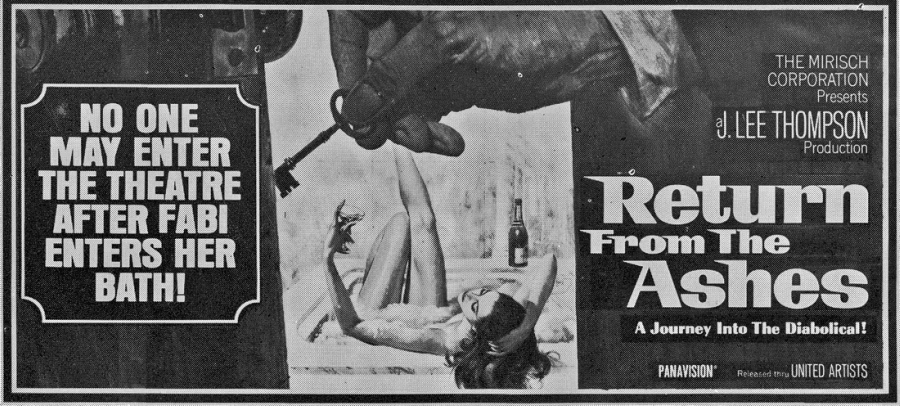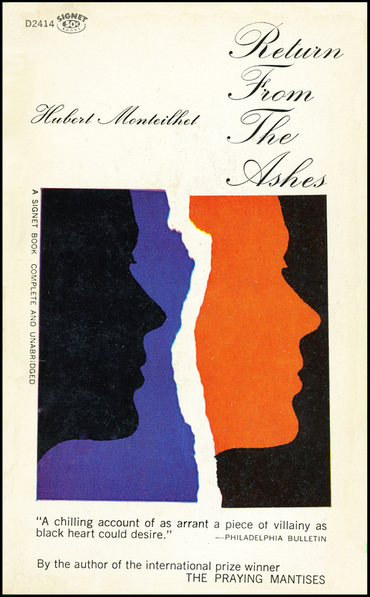Return From The Ashes (1965)
Though he's remembered for action hits such as the original Cape Fear (1962), The Guns Of Navarone (1961), and Mackenna's Gold (1969), the late J. Lee Thompson's filmography spans a surprising number of genre films in both the U.S. and his native Britain. The cutesy Diana Dors romantic comedy and once late-night television staple An Alligator Named Daisy (1955) is sandwiched in between the sleaze of Young And Willing (1954) and 1956's Palme d'Or nominee Blonde Sinner, both also with Dors. The ocean-hopping Thompson later made musicals (1974's Huckleberry Finn), a slasher film (Happy Birthday To Me, 1981) and several of Charles Bronson's Death Wish sequels. His career ended at low-budget studio Cannon and the unfortunate Kinjite: Forbidden Subjects (1989), in which Bronson's angry vice cop shoves an impressive-sized dildo up a john's ass.

But the most uncommon title in Thompson's filmography is Return From The Ashes (1965), a black-hearted thriller based on Hubert Moneilhet's 1963 novel Le Retour des Cendres (translated "The Return Of The Ashes"). Though Thompson's previous film had been the satirical William Peter Blatty-scripted color farce John Goldfarb, Please Come Home! (1965) with Shirley MacLaine, this shadowy black-and-white follow-up more closely resembles a nod in Hitchcock's direction. In fact, film rights for the novel had originally been snapped up by Henri Georges Clouzot, often called the "French Hitchcock." Thompson purchased the option and for his actors cast Maximilian Schell and Samantha Eggar, the former following his role as a suave thief in Jules Dassin's Topkapi (1964) and the latter a media sensation from her role as Terence Stamp's kidnap victim in William Wyler's The Collector (1965).
Thompson also brought in Ingrid Thulin from Ingmar Bergman's films to portray his lead, Dr. Michele Wolf, a physically and mentally scarred concentration camp survivor who returns to Paris following liberation. After secretly settling into a nondescript hotel under an assumed name, Wolf tracks down her opportunistic chess player husband Stanislaus Pilgrin (Schell). The suave cad doesn't recognize her, but is struck by her similarity to the wife he believes died in the camps. Eager to get his hands on the cash Wolf has inherited from relatives killed by the Nazis, the destitute Pilgrin embarks on enlisting this "lookalike" to pose as his wife without realizing that he's asking his still-living spouse to portray herself!
Thompson also brought in Ingrid Thulin from Ingmar Bergman's films to portray his lead, Dr. Michele Wolf, a physically and mentally scarred concentration camp survivor who returns to Paris following liberation. After secretly settling into a nondescript hotel under an assumed name, Wolf tracks down her opportunistic chess player husband Stanislaus Pilgrin (Schell). The suave cad doesn't recognize her, but is struck by her similarity to the wife he believes died in the camps. Eager to get his hands on the cash Wolf has inherited from relatives killed by the Nazis, the destitute Pilgrin embarks on enlisting this "lookalike" to pose as his wife without realizing that he's asking his still-living spouse to portray herself!

After reluctantly agreeing to cooperate with Pilgrin's deception, Wolf learns that her estranged step-daughter Fabienne (Eggar) is not only her husband's new girlfriend but the mastermind of the scheme to claim the inheritance. Appalled by the news of Pilgrin's horrendous offer, Wolf's old friend and medical colleague Dr. Bovard (Herbert Lom) unsuccessfully urges her to end the deception. Yet Wolf cannot resist attempting to reclaim her former life as the sugar mama of an amoral gigolo. The conclusion revolves around a murder scheme that could have been lifted from an episode of "Alfred Hitchcock Presents," but it's assuredly more audience-friendly than the darker outcome of Moneilhet's novel (as is the disturbing train car incident of the pre-credits sequence).
Those familiar with Thompson only through his better-known genre entries will be unprepared for the austere look of Return From The Ashes, which from its visual style and complexity of characters more closely resembles a European art film than anything else in the director's filmography. "Resembles" because, though set in Paris, Return From The Ashes was actually made at MGM Studios in Borehamwood, England. The studio and backlot locations convincingly suggest Parisian streets, though the illusion is somewhat compromised by having characters of a film set in Paris speak English to one another, albeit with a bogus accent.
Thulin is outstanding in an odd, complex role, and is ably supported by Schell, Eggar, and Lom. The late cinematographer Christopher Challis, who had shot The Tales Of Hoffman (1951) and others for the Archers, rendered the moral corruption at the film's heart in suffocating shades of dark. The sultry sixties' score is by the late (Sir) John Dankworth, who the previous year had composed the soundtrack for John Schlesinger's successful Darling. The script was adapted from the novel by screenwriter Julius J. Epstein (Casablanca), and inventively reimagines the book's diary-entry format. But despite its fans, Return From The Ashes was an international box-office disappointment. Thompson stated his belief that filming certain scenes in Paris, an idea which had been rejected due to the film's modest budget, would have improved the film's box office. Critics pointed to the script's unlikely coincidences as the problem. More likely, word of mouth about the grim subject matter, combined with the near-total lack of racy content, despite a suggestive advertising campaign, made Return From The Ashes a tough sell for its distributors. It deserves better than its current obscurity.
Return From The Ashes is available as a made-to-order DVD-R from the MGM Limited Edition collection in a decent widescreen print. The only extra is the original theatrical trailer, which, though a poor representation of the film itself, owes considerable debt to the showmanship of Alfred Hitchcock and his imitator William Castle. Recently, German filmmaker Christian Petzold remade Moneilhet's novel as the excellent Phoenix (2014), which is slated for a 2015 U.S. release.
Those familiar with Thompson only through his better-known genre entries will be unprepared for the austere look of Return From The Ashes, which from its visual style and complexity of characters more closely resembles a European art film than anything else in the director's filmography. "Resembles" because, though set in Paris, Return From The Ashes was actually made at MGM Studios in Borehamwood, England. The studio and backlot locations convincingly suggest Parisian streets, though the illusion is somewhat compromised by having characters of a film set in Paris speak English to one another, albeit with a bogus accent.
Thulin is outstanding in an odd, complex role, and is ably supported by Schell, Eggar, and Lom. The late cinematographer Christopher Challis, who had shot The Tales Of Hoffman (1951) and others for the Archers, rendered the moral corruption at the film's heart in suffocating shades of dark. The sultry sixties' score is by the late (Sir) John Dankworth, who the previous year had composed the soundtrack for John Schlesinger's successful Darling. The script was adapted from the novel by screenwriter Julius J. Epstein (Casablanca), and inventively reimagines the book's diary-entry format. But despite its fans, Return From The Ashes was an international box-office disappointment. Thompson stated his belief that filming certain scenes in Paris, an idea which had been rejected due to the film's modest budget, would have improved the film's box office. Critics pointed to the script's unlikely coincidences as the problem. More likely, word of mouth about the grim subject matter, combined with the near-total lack of racy content, despite a suggestive advertising campaign, made Return From The Ashes a tough sell for its distributors. It deserves better than its current obscurity.
Return From The Ashes is available as a made-to-order DVD-R from the MGM Limited Edition collection in a decent widescreen print. The only extra is the original theatrical trailer, which, though a poor representation of the film itself, owes considerable debt to the showmanship of Alfred Hitchcock and his imitator William Castle. Recently, German filmmaker Christian Petzold remade Moneilhet's novel as the excellent Phoenix (2014), which is slated for a 2015 U.S. release.